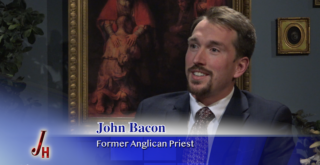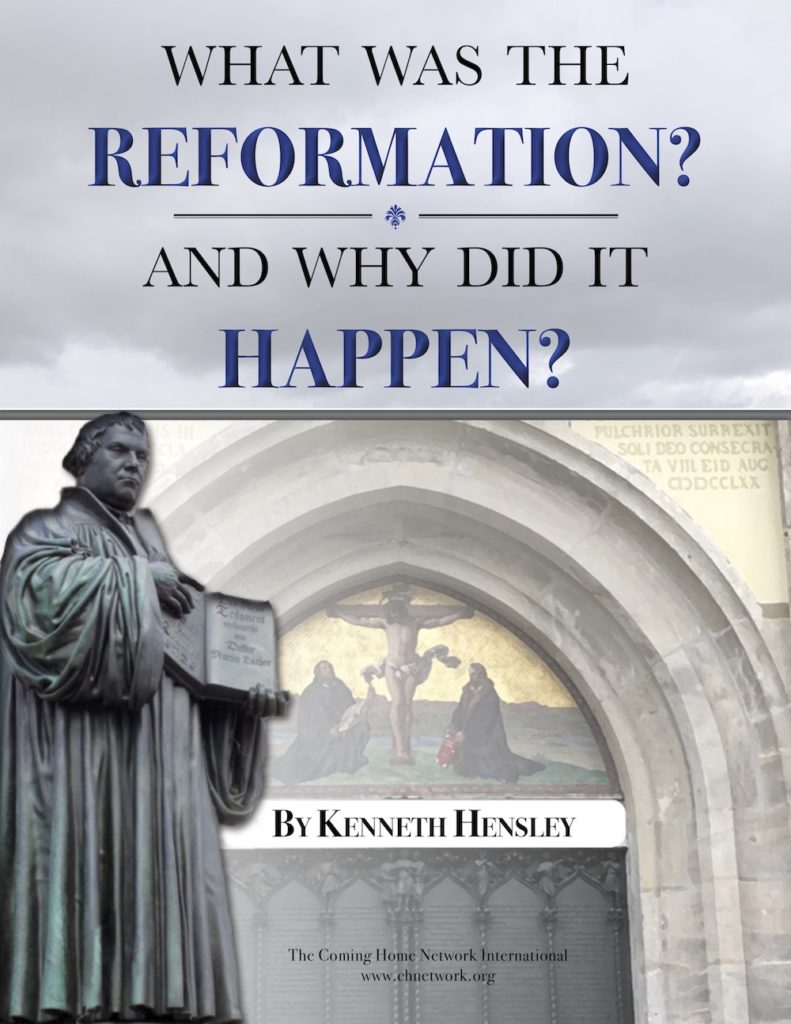
There is an old story, which I’m sure most of you have already heard and of which I’m a bit stale on the details, but it is the best story I can think of to illustrate a point I believe needs to be made in the midst of this apologetic discussion of the issues of salvation and justification. The story goes something like this …
Years ago along the northern coast of New England there was a small village. Directly off the coast within sight of land was a treacherous shoal of rocks. During one particularly devastating Nor’easter, a sailing ship with over a hundred passengers struck the rocks and sank. People watched helplessly from shore as the ship and her passengers were smashed again and again against the rocks. Shocked by what they witnessed, they immediately swore to never let this happen again.
A Life Saving Society was established with rescue boats, life-preservers, blankets, emergency rations, as well as training courses on how to use the boats, to maintain their equipment and to administer medical assistance when necessary. Everyone in this small town was involved and deeply committed to the Society’s goals.
A year went by and then again during the stormy season another ship faced similar peril, but this time the Society was ready, and almost all on the ship were saved. Great rejoicing followed, with new plans to insure that next time all would be saved.
Years went by, and although the stormy seasons came as usual, no ships came near the rocks. But the Society continued. New generations of recruits were sworn in, and since no ships were imminently in peril, they eventually saw the need to add other activities to help fight boredom. There were athletic teams, nature clubs, fellowships for all ages, as well as debating societies. New facilities were needed to accommodate all these new activities, and the attractive and spacious grounds became a bragging point for this small community. Sometimes large crowds would come from miles around to hear well respected debaters argue over a wide range of topics, including such things as what was the optimum number of rowers per boat versus the number of people needed on shore, who had the authority to organize a society, or even over the legalities incurred over rescuing versus not rescuing people.
As years went by and no ships crumbled on the rocks attendance and membership began to dwindle, so additional programs were instituted to encourage the recruitment of new blood. Colorful uniforms were awarded to those of higher rank and trophies were given to those with the highest attendance or recruitment statistics. Being a high ranking member of the Society became a mark of prestige in the community and even an expected line item on one’s resume if one intended to run for public office. Often at political rallies one would hear candidates debating over the future needs and goals of the Society, sometimes even boldly questioning whether, given the growing financial needs of the struggling community, the Society had long since outlived its purpose. Was it truly their responsibility to save these souls? Hadn’t these foolish seafaring people accepted the perils they faced when they set sail? Was it not all a part of the will of God whether they lived or died? A part of His greater plan?
Then one day during the annual storming season, the worst Nor’easter in years hit, and a large sailing vessel carrying one hundred thirty-eight emigrants bore down on the rocks. The few remaining members of the Society watched with terror from shore. They wrung their hands and gnashed their teeth, for not only had the life-saving boats and equipment long since disintegrated due to neglect, but the members no longer knew how to use them. They were also split over whether they should or should not make any valiant efforts to save these people. Wasn’t their fate solely in the hands of God? It was a shame to watch them perish but wasn’t it somehow God’s will, His predestined plan? Wasn’t their primary responsibility to pray for those in peril, hoping that God in His infinite mercy might choose to save their lives and souls? Or on the other hand others argued that it was up to them to rescue these dying people. God had placed them there at that moment with the freedom to respond to their desperate need, and it was how they responded that would determine not only the fate of the people on the ship, but their own eternal destinies. God would judge them by how they treated “the least of these!”
The Life Saving Society remnant stood arguing, debating, impotent to do anything out of neglect, while all one hundred thiry-eight emigrants perished.
This story, of course, can be used to illustrate all kinds of things in the mission, or lack there of, of the Church. But I was reminded of this story as I read through the many articles we were considering for inclusion in this Journal. I remembered debates I have heard (and taken part in) over different aspects of all that is necessary for Salvation, not just between Catholics and Protestants, but also between different Protestant sects—especially during my seminary days—and I sensed the need to include a cautionary thought: that we not miss the central most critical issue which is too often missing in our polemics.
Those arguing for “the necessity of both Faith and works done in Grace” can be just as wrong as those arguing for “Faith Alone” if either one forgets this most essential, central critical element. And I believe that in both cases if this central element is not only remembered and emphasized, but also experienced through humble surrender, then the end result for both sides of the debate will be essentially the same: people being saved by faith through grace in Jesus Christ and in and through his Church.
This central, critical element is simply the necessity for changed hearts.
We can believe all the correct things, even profess them with our lips, we can have the faith to move mountains, but as St. Paul emphasizes in Romans 10:9-10, we must believe them in our hearts. Faith alone without a changed heart cannot save you. Saying a quick prayer during an emotional moment at a crusade, camp meeting or altar call can’t save anyone without a heart touched and changed by the Holy Spirit. With a changed heart, one’s faith will lead to the recognition of the need for repentance and surrender of self to Christ; for forgiveness of self and others; for charity towards God and others; for prayer for self, others and even enemies; for a constant increase of Christ and decrease of self; for a life of obedience, holiness and growth in grace. Any sincere Evangelical knows this to be true as witnessed by the thousands of sermons calling for changed hearts preached from pulpits all over America. But sometimes this is lost in the debates over semantics.
We can also do all the good works and rituals expected of us by our Church. We can faithfully fulfill every ‘rite-of-passage’ and regularly practice every sacrament and sacramental. We can staunchly defend every doctrine, dogma or legislation of our Church, fighting even against those in our own Church who might desire to water down the requirements. But without changed hearts, all of this is meaningless grandstanding. A Rosary said because one should or must, without a changed heart, without a heart in surrender and love of Christ, is just what Jesus warned about in Matthew 6-—“babble like the pagans, who think they will be heard because of their many words.” Again any sincere Catholic knows this to be true, evidenced by the thousands of sermons calling for changed hearts preached from Catholic pulpits all over America.
St. Paul seems to be the most often quoted supporter of both sides of the debate, but even he strongly emphasizes the necessity of a changed heart. For example, in I Corinthians 13 we hear him with great conviction argue that love is greater than anything else, including faith. But when one looks at how he describes the kind of love that is greater than all, isn’t it obvious that what he is really talking about is a changed heart: love that springs from a heart that is patient, kind, not jealous, not pompous, not inflated, not rude, not self-seeking, not quick tempered, etc.?
St. James is also another witness often brought into the debate, but what does he say?
If anyone thinks he is religious and does not bridle his tongue but deceives his heart, his religion is vain. Religion that is pure and undefiled before God and the Father is this: to care for orphans and widows in their affliction and to keep one self unstained by the world…Who among you is wise and understanding? Let him show his works by a good life in the humility that comes from wisdom. But if you have bitter jealousy and selfish ambition in your hearts, do not boast and be false to the truth. Wisdom of this kind does not come down from above but is earthly, unspiritual, demonic. (1.26-27; 3.13-15)
I could easily make a longer, detailed Scriptural defense of this, but the best way to recognize the necessity of a changed heart as a requirement for salvation and justification is to listen to what Jesus taught about how we are saved. I don’t mean reading Jesus through “the eyes of Paul” or through our particular interpretation of Paul (plan A versus plan B, etc.), but merely reading the words of Jesus and listening for what he told his followers was necessary for their salvation.
Recently I read through the Gospel of St. Matthew listening for Jesus’ instructions on this and I ended up with over ten pages of notes. Nearly everything he said challenges us to have hearts surrendered to the Father as the foundation for our faith and our works. Apart from changed hearts, both faith and works are powerless to bring us to the Father. I leave this project primarily to you, for unless we do it for ourselves, nothing anyone summarizes can truly change our hearts. But here are a few snippets from Matthew:
Repent, for the kingdom of heaven is at hand. (4.17)
Jesus’ proclamation was the same as His precursor, John the Baptist, and what were they both calling their followers to but changed hearts? Earlier when the Scribes and Pharisees came forward to be baptized (3.7-12), why was John so mad that they came?! Why wasn’t he elated to see them? Weren’t these the same teachers of truth Jesus would later tell his disciples to follow (23.1-12) though not imitate? Wasn’t the problem in both places that the Pharisees had hard hearts? (cf., Mk. 3.5)
Blessed are … for they shall see God …
I remember that the Beatitudes were a bit of a bug-a-boo for us “Faith alone” folks, some of us relegating them to “Plan A” which had then been replaced by Paul’s “Plan B.” But aren’t these in fact the most clear statement of how Jesus understood the necessity of changed hearts if we are to “see God” (5.3-12)?
Love your enemies and pray for those who persecute you, SO THAT you may be sons of your Father who is in heaven … You, therefore, must be perfect, as your heavenly Father is perfect. (5:44-48)
Being a “child of God” is a common Scriptural description of those who are being saved (John 1.12-13; 1 John 3.1-3), but here Jesus states that one criterion for becoming a son of the Father is a changed heart—not the mere act of loving or praying for an enemy, but a heart sincerely and sufficiently open to doing this.
…your Father who sees in secret will reward you. (6.1-18)
What is it about our prayers, our alms giving, our fasting, our actions, and our beliefs that the Father is looking for in secret? Is it not the sincerity of our hearts?
Lay up for yourselves treasures in heaven …for where your treasure is, there will your heart be also. (6.20-21)
Where your heart is will be the key to what ever rewards in heaven we receive from the Father. Is this only those rewards we receive after salvation, or is this not also the reward of salvation itself?
Not every one who says to me, ‘Lord, Lord,’ shall enter the kingdom of heaven, but he who does the will of my Father who is in heaven. (7.21)
These are very strong words from our Savior, but what’s missing from someone’s inadequate profession is not merely good works, but all the things Jesus has been teaching up to this point, which involves hearts that are surrendered to the will of God.
Lord, I am not worthy to have you come under my roof; but only say the word, and my servant will be healed.…Truly, I say to you, not even in Israel have I found such faith. (8.8-10)
Was it merely this centurion’s belief in Jesus’ miraculous powers that impressed Jesus, or was it not his humble, malleable heart which caused him to set aside his Roman attitude of superiority to recognize his true unworthiness?
Go and learn what this means, ‘I desire mercy, and not sacrifice.’ For I came not to call the righteous, but sinners. (9.13)
The righteous were those who may have believed and claimed the right things or who did the right things, but who did so from self-centered hearts. What Jesus wanted instead were those who had humbly faced up to their sinfulness—those with changed hearts.
You brood of vipers! How can you speak good, when you are evil? For out of the abundance of the heart the mouth speaks…. I tell you, on the day of judgement men will render account for every careless word they utter; for by your words you will be justified, and by your words you will condemned. (12:34-37; see also 15.18)
Seems like our words are VERY important, both to eternity and to our justification. But NOT our mere words (see also 10:32-33), but the source of these words: our heart.
You hypocrites. Well did Isaiah prophesy of you, when he said: ‘This people honors me with their lips, but their heart is far from me; in vain do they worship me, teaching as doctrines the precepts of men.’ (15.7-9)
BOTH sides of the debate can be equally guilty here, because if our teaching of either “Faith Alone” or “Faith and works” is done apart from also emphasizing that a changed heart is crucial for salvation, then our teachings can become merely precepts of men.
There is so much more in Matthew and the other gospels as well as the other New Testament epistles that clearly emphasize the central importance of a changed heart as the underlying criterion for salvation, and my guess is that most of you reading this are saying, “Duh, who said otherwise?!”
Well, the fact that Christians are so uncharitably divided over these very polemics—men and women, scholars, clerics, and laity; churches, movements, denominations; taking sides and railing vengeful, hateful, prideful and boastful epithets at one another—all of this and more proves to me that these polemics, as important as these distinctions are, too often blind us to what is most important: “You shall love the Lord your God with all your heart, and with all your soul, and with all your mind …You shall love your neighbor as yourself” (22.37-38).
One last quote from Jesus. In this statement, which is perhaps his clearest on what it truly takes to be a disciple, he doesn’t emphasize “faith alone,” though faith is certainly presumed, and he doesn’t emphasize “faith and works,” though again works are clearly mentioned. What He requires are hearts changed and surrendered and submissive to the will of God.
If any man would come after me, let him deny himself and take up his cross and follow me. For whoever would save his life will lose it, and whoever loses his life for my sake will find it. … For the Son of Man is to come with his angels in the glory of his Father, and then he will repay every man for what he has done. (16.24-27)
My wife Marilyn and I recently returned from our first pilgrimage to the Holy land. It was a blessed experience, and there is much I would love to tell you. But there was one particular incident that sticks out in my mind which clearly emphasizes this point.
We were at the Church of the Nativity in Bethlehem, an ancient Byzantine church, the oldest surviving church in Israel, built over the cave where from antiquity it is believed Jesus was born. To get down to the spot marked with a star one must walk bent over through a stone tunnel, one at a time, into the ancient cave.
While we were there waiting in line, there were over two hundred other Christian pilgrims from all over the world, representing many languages, cultures, customs, and sects, all trying anxiously to get into the tunnel. There was so much excitement about touching the very place where Christ was supposedly born, that people began shoving and cutting into line. Some began yelling back and forth—maybe even cursing, though I couldn’t understand their languages.
At one point a priest of another Christian tradition became so angry that his particular pilgrims weren’t able to “cut in line” that he began pushing through the crowd ordering everyone to make way for his people. But he was quickly shouted down by those in front until he gave up and his group was ordered by the guards to go to the end of the line. All of this just to see the sight where Our Savior—the gift of God’s love—was born! Had we forgotten why Jesus had come? Where were our hearts?
When I listen to two Christians arguing over whether we our saved by “Faith Alone” or by “Faith and works,” I also wonder whether we have forgotten:
By this all men will know that you are my disciples, if you have love for one another (John 13.35).
And what does Jesus mean by having love (agapein exeite) except loving one another from hearts truly changed by His love?










